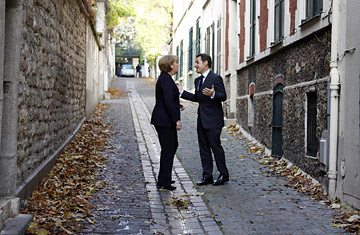
German Chancellor Angela Merkel, left, and French President Nicolas Sarkozy arrive for a lunch during a Franco-German meeting in Paris on Nov. 24
Rattled Americans have found some solace in the news that President-elect Barack Obama is working quickly with congressional Democrats to finalize details of a mammoth stimulus package expected to total between $500 billion and $700 billion. Europeans have been less lucky. So far, they've had to content themselves with a patchwork of national recovery plans frequently at odds with one another. A European Union–wide program, if leaders can even agree on one, is likely to be worth a comparatively anemic $130 billion.
The contrasting responses mark an interesting shift in how the two Western powers are handling the ongoing economic crisis. Europe was initially lauded for its dramatic bailouts of banks and plans to reshape the global financial system. But in the past couple of weeks, as Obama has begun to outline a package featuring the largest U.S. public spending effort since the Depression-era New Deal, Europe has started to look like it's dragging its feet. (See pictures of the world reacting to Obama's win.)
The European Commission has struggled to overcome divisions among E.U. member states over its stimulus package, details of which are due to be announced on Thursday. The commission wants member states to agree to spend about $163 billion to stimulate growth beyond the separate national recession-battling plans. That sum — about 1% of the E.U.'s combined GNP — would mostly be comprised of money already earmarked for investment in certain regions, sectors and infrastructure. Le Nouveau Deal, it is not.
"Based on what we're hearing about the package, it not only involves very little funding beyond what was already in the pipes, but at 1% of GNP, it represents a very timid response to recession," says Karel Lannoo, an economic expert and chief executive officer of the Center for European Policy Studies in Brussels. "By contrast, the $2 trillion to $2.2 trillion used to keep Europe's financial sector from collapsing represents around 17% of E.U. GNP. That, too, was promised by national governments but was the result of more coordinated and better funded reaction to crisis."
Even coordinating national stimulus plans has consisted of little more than leaders agreeing to disagree. On Nov. 24, for example, Britain announced an eye-popping $30 billion plan that aims to borrow and spend its way out of the worst recession to hit the nation in 17 years. Wide-ranging measures include offering aid to homeowners and small businesses, and cutting value-added tax (VAT) 2.5 points, to 15%, to stimulate consumer spending.
The reaction to the plan was swift — and far from the general applause Britain's leaders received for their bank-bailout plans just six weeks ago. "A general decrease in value-added tax is perhaps the answer for some countries, but for Germany and France it is not," said German Chancellor Angela Merkel, following a meeting with French President Nicolas Sarkozy on a common European response to the economic downturn. Asked Sarkozy: "Should we use up our available room for maneuver on reducing prices when prices are already falling?"
Normally, E.U. countries must obtain approval from Brussels to reduce their VAT rates. But Europe's rescue package might include a provision for countries to cut their VAT rate unilaterally. In snarking at this idea, Merkel and Sarkozy are probably sending a message to other member states that are contemplating following Britain's lead.
But the pair also did some barking at each other. Merkel flatly rejected her host's urgings that Germany go beyond the $41 billion in economic spending that Berlin has promised for the next two years. Sarkozy pointedly contrasted Merkel's stand-firm position with his own plans to continue deploying new funds to fight recession. "France is working on it," Sarkozy said of further stimulus spending. "Germany is thinking about it."
— With reporting by Catherine Mayer / London
